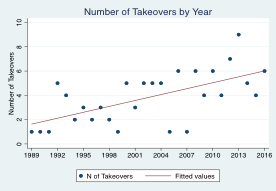
I’m very pleased to share a new paper I've coauthored with @JoshBleiberg examining the effect of state takeover of school districts on student test-based academic achievement and educational inputs, recently accepted at JPAM: edworkingpapers.com/ai21-411 1/n
Not only do the results have implications for policy aimed at improving low-performing school systems but also represent a rare test of the effectiveness of alternative education governance arrangements beyond the typical locally elected school board model. 2/n
We track all takeovers from the first in the late 1980s through 2016, building on previous tracking work by @aejochim @DomingoMorel, Ken Wong, and others, and find takeovers have become more common and shorter over time. 3/n 

Takeover districts are indeed low performing but we find that academic performance plays less of a role in predicting takeover for districts serving larger concentrations of African American students. 4/n 

Studying the effect of takeovers on student achievement has historically been difficult b/c takeover is rare within any individual state and it’s been hard to compare tests across states. We combine our tracking info w/ @seda_data that allows for cross-state comparisons. 5/n
On average, we find no evidence that takeovers from 2011-2016 generated academic benefits. It was disruptive in the early years, esp. for ELA, though longer-term effects are less clear. We find no fx on district composition, class size, charter sector size, or spending. 6/n
However, we see heterogeneity of fx across districts, w/ positive fx of the Lawrence, MA takeover, for ex. Unfortunately, New Orleans, the other major recent takeover that’s been rigorously studied by @douglasharris99 Larsen & others, falls outside our achievement data window 7/n
We are limited in what we can say about the mechanisms that explain our findings but it doesn’t seem to be a simple story about state capacity, as we see positive and negative cases within states. 8/n
Takeovers were least effective in districts w/ higher baseline achievement & least harmful in majority-Latinx communities, aligned w/ @DomingoMorel finding that takeover decreases descriptive representation for maj.-Black communities but increases it for maj.-Latinx ones. 9/n
Our evidence is therefore consistent with a story that descriptive representation (on school boards) benefits student outcomes, as @vkoganpolisci @zpeskowitz and others have found. 10/n
We conclude that leaders should be cautious about deploying takeover to improve achievement, particularly in majority-Black communities or districts that otherwise look different from contexts where this has generated benefits in the past. 11/n
Perhaps school boards are "the worst form of government except all those other forms that have been tried from time to time”??? #winstonchurchill 12/n
Special shout out to my awesome coauthor @JoshBleiberg who will likely be on the job market at some point in the not-so-distant future. sites.google.com/view/joshbleib… 13/n
I'm grateful to @RussellSageFdn and @wtgrantfdn for funding the work, and many others for feedback, not limited to: @btskinner @daphnabassok @jhwyckoff @seanfreardon @loeb_susanna Adam Kho @MatthewAKraft @EdPolicyWorks @UVAEdu @UVABatten @hgse @Kennedy_School @AnnenbergInst 14/n
I also learned a ton from previous mentors and collaborations that informed this project with folks including @JoshuaSGoodman @ProfDavidDeming @ProfMartyWest @HarvardCEPR @MemeMedianMode @WhitneyKoz. Many thanks! 15/15
• • •
Missing some Tweet in this thread? You can try to
force a refresh



